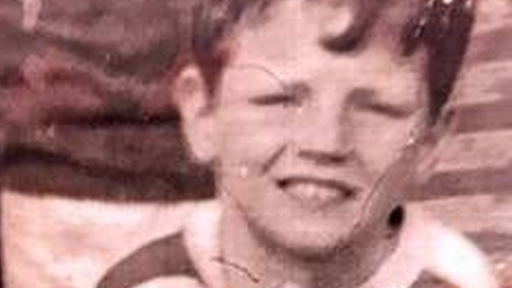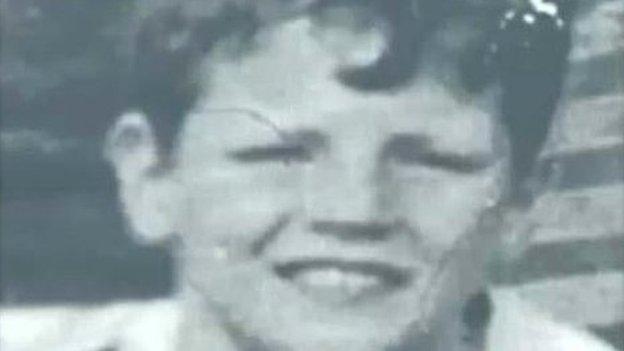Francis Rowntree killing 'not justified' - coroner
- Published

Francis Rowntree was shot by a soldier in west Belfast in 1972
The killing of an 11-year-old boy, shot by an Army rubber bullet in Belfast during the Troubles, was not justified, a coroner has ruled.
Francis Rowntree was shot by a soldier in the Divis Flats area of west Belfast in 1972.
The soldier who fired the rubber bullet used "excessive force", coroner Brian Sherrard said.
The Rowntree family welcomed the findings, but will be pursuing a civil action against the Ministry of Defence.
Granted anonymity
Francis, a pupil at St Finian's Primary School, was shot in the head on 20 April 1972 and died two days later.
His wounds included skull fractures and lacerations of the brain.
He was the first person in the Troubles to die after being wounded by a rubber bullet.
Following an investigation by the Historical Enquiries Team in 2010, a fresh inquest into his death was ordered.
The soldier who fired the bullet was granted anonymity during the inquest and was known only as Soldier B.
He told the court he did not remember the exact day in question.
The incident took place amid claims a group of people were rioting and throwing stones at soldiers.
'Fired without warning'
Mr Sherrard said the soldier was not given any training in the use of rubber bullets or made aware that they were potentially lethal.
"There was no justification for the use of lethal force at the time that Francis was shot," Mr Sherrard said.
"The force used was in excess of what was needed to achieve Soldier B's objectives," he added.
Outlining the preliminary findings, Mr Sherrard said he was confident Francis was not involved in rioting.
It has been disputed whether the boy was struck directly or hit by a ricocheting rubber bullet.
Eye witnesses, including a lieutenant instructing the soldiers, told the court that a crowd gathered around a vehicle carrying a number of soldiers which stopped in the area.
'Curiosity'
There was a disturbance and some members of the crowd became hostile and threw objects, including stones, at the vehicle.
The court was told a number of youths had come to watch the disturbance out of curiosity.
The court also heard that two rounds of rubber bullets were fired by a soldier to disperse the crowd, and that one of the bullets hit the boy's head.
No warning was given before the shots were fired.
Mr Sherrard said the Ministry of Defence should have been aware by the time of the incident that rubber bullets could cause serious harm.
He said: "The state provided Soldier B with a lethal weapon without notifying him of its potential lethality or training him in its use.
"The absence of adequate training made it impossible for Soldier B to assess whether to use lethal force.
"He fired without warning into the crowd, which was not aimed at any individual," he added.
The coroner also said the child had been at the scene to "observe the disturbance".
Mr Sherrard is due to consider further matters including the soldier's anonymity, before delivering his final findings in the inquest.
'Legal victory'
The Rowntree family welcomed the findings of the coroner and issued a statement through their solicitor, Pádraig Ó Muirigh.
"Many young children were killed and maimed by the rubber bullet and its successor, the plastic bullet," the statement said.
"Their use, free from regulation and training, amounted to a systemic abuse of human rights.
"These findings are not only a legal victory for the Rowntree family but for all those who campaigned for many years for these lethal weapons to be banned."
- Published26 April 2016

- Published13 April 2016

- Published12 April 2016
